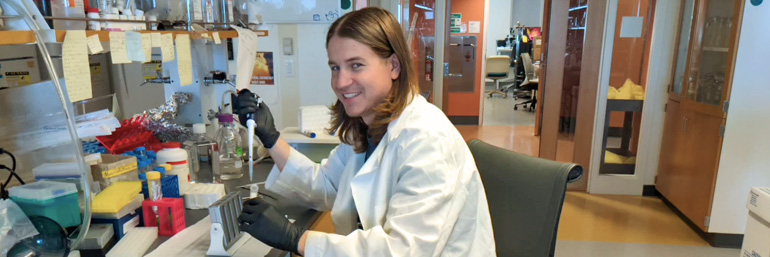Jan 8

Next stop for recent Ph.D. grad: Stanford’s School of Medicine
Cody Juguilon successfully defended his dissertation – titled “Understanding the Mechanisms of Coronary Microvascular Dysfunction in Diabetes” – on Nov. 29, earning his Ph.D. from the Integrated Pharmaceutical Medicine program (now Basic and Translational Biomedicine). Shortly thereafter, he accepted a post-doctoral fellowship in the lab of Joseph Wu, M.D., Ph.D., at the Stanford University School of Medicine.
“This is a tremendous accomplishment for Cody,” Matthew Smith, Ph.D., co-director of the graduate program, said. “Dr. Wu leads the Cardiovascular Institute at Stanford Medicine and is recognized as being within the top 1% of highly cited researchers in the last five years.”
Not bad for the kid from Parma, Ohio.
Dr. Juguilon earned a bachelor’s degree in biotechnology from Kent State University. While still an undergraduate, he began volunteering in the NEOMED lab of Liya Yin, M.D., Ph.D., FCVS, FAHA, working on models of coronary collateral growth.
“From there, I was interested in some more of her research and ended up applying to the IPM program, where I eventually joined her laboratory,” Dr. Juguilon said.
“I am so happy for Cody,” Dr. Yin noted. “Dr. Wu is currently the President of the American Heart Association. Cody has applied for and received an NIH T32 postdoc fellowship at Stanford University. I am optimistic about his future in research.”
It was Dr. Yin who introduced him to Dr. Wu during a conference of the American Heart Association held in Chicago in Fall 2022.
While he had not settled a specific project to work on during his fellowship, it will likely relate somehow to his work at NEOMED.
“I started working on a lot of projects [in the Yin Lab], but I eventually homed in on trying to understand the mechanisms governing diabetic vascular dysfunction in the heart. Understanding these basic mechanisms could give rise to potential therapeutics,” he said.
“Coronary microvascular dysfunction is prevalent across many different diseases, including diabetes, but we don’t have a complete understanding,” he explained, with enthusiasm. “We wanted to study it in diabetes in particular because it’s so prevalent in this population and it contributes to cardiac disease. By understanding the mechanisms, again, you can potentially treat it and improve cardiovascular outcomes in diabetes.”
He’s looking forward to the next chapter in his career in California.
“I am very excited to move to California and to work at Stanford. They have some very nice research facilities, and it is a great place for career development.” Dr. Juguilon said. “Overall, it’s an excellent opportunity.”


